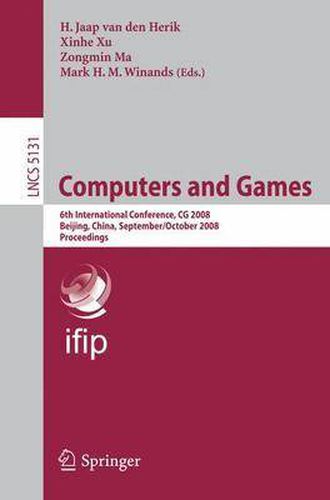Readings Newsletter
Become a Readings Member to make your shopping experience even easier.
Sign in or sign up for free!
You’re not far away from qualifying for FREE standard shipping within Australia
You’ve qualified for FREE standard shipping within Australia
The cart is loading…






This book contains the papers of the 6th Computers and Games Conference (CG 2008)held in Beijing, China. The conference took place from September 29 th to October 1, 2008 in conjunction with the 13 International Computer Games th Championship and the 16 World Computer Chess Championship. The Computers and Games conference series is a major international forum for researchers and developers interested in all aspects of arti?cial intelligence and computer game playing. The Beijing conference was de?nitively charact- ized by fresh ideas for a large variety of games. Earlier conferences took place in Tsukuba, Japan (1998),Hamamatsu, Japan (2000), Edmonton, Canada, (2002), Ramat-Gan, Israel (2004), and Turin, Italy (2006). The Programme Committee (PC) received 40 submissions. Each paper was initiallysenttoatleasttworeferees.Ifcon?ictingviewsonapaperwerereported, itwassenttoanadditionalreferee.Outofthe40submissions,onewaswithdrawn before the ?nal decisions weremade. With the help of many referees (listed after the preface), the PC accepted 24 papers for presentation at the conference and publication in these proceedings. Theabove-mentionedsetof24paperscoversawiderangeofcomputergames. Twelve of the games are played in practice by human players, viz., Go, We- ern Chess, Chinese Chess (Xiangqi), Japanese Chess (Shogi), Amazons, Chinese Checkers, Hearts, Hex, Lines of Action, Othello, Siguo, and Spades. Moreover, there was onepuzzle, viz., SameGame, andtwo theoreticalgames,viz., Synch- nized Domineering and multi-player Can’t Stop. Thepapersdealwithmanydi?erentresearchtopicsincludingcognition,c- binatorial game theory, search, knowledge representation, and optimization. We hope that the readerswill enjoy the researche?orts of the authors.Below we provide a brief outline of the 24 contributions, in the order in which they are printed in the book.
$9.00 standard shipping within Australia
FREE standard shipping within Australia for orders over $100.00
Express & International shipping calculated at checkout
This book contains the papers of the 6th Computers and Games Conference (CG 2008)held in Beijing, China. The conference took place from September 29 th to October 1, 2008 in conjunction with the 13 International Computer Games th Championship and the 16 World Computer Chess Championship. The Computers and Games conference series is a major international forum for researchers and developers interested in all aspects of arti?cial intelligence and computer game playing. The Beijing conference was de?nitively charact- ized by fresh ideas for a large variety of games. Earlier conferences took place in Tsukuba, Japan (1998),Hamamatsu, Japan (2000), Edmonton, Canada, (2002), Ramat-Gan, Israel (2004), and Turin, Italy (2006). The Programme Committee (PC) received 40 submissions. Each paper was initiallysenttoatleasttworeferees.Ifcon?ictingviewsonapaperwerereported, itwassenttoanadditionalreferee.Outofthe40submissions,onewaswithdrawn before the ?nal decisions weremade. With the help of many referees (listed after the preface), the PC accepted 24 papers for presentation at the conference and publication in these proceedings. Theabove-mentionedsetof24paperscoversawiderangeofcomputergames. Twelve of the games are played in practice by human players, viz., Go, We- ern Chess, Chinese Chess (Xiangqi), Japanese Chess (Shogi), Amazons, Chinese Checkers, Hearts, Hex, Lines of Action, Othello, Siguo, and Spades. Moreover, there was onepuzzle, viz., SameGame, andtwo theoreticalgames,viz., Synch- nized Domineering and multi-player Can’t Stop. Thepapersdealwithmanydi?erentresearchtopicsincludingcognition,c- binatorial game theory, search, knowledge representation, and optimization. We hope that the readerswill enjoy the researche?orts of the authors.Below we provide a brief outline of the 24 contributions, in the order in which they are printed in the book.